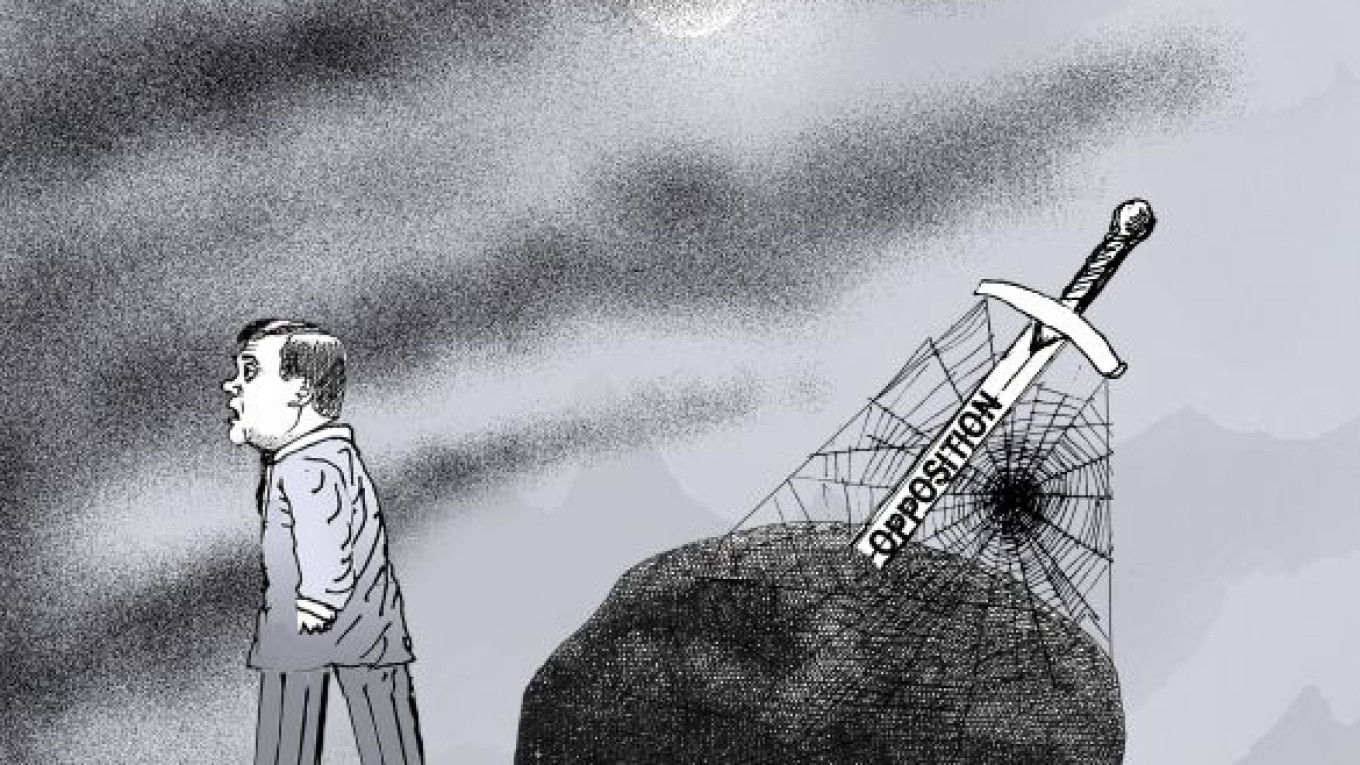It seems that everyone is an expert on the Middle East nowadays. Political scientists, bloggers, radical opposition and media are commenting, seeking parallels, admiring the battle spirit of the Arabs and cursing the corrupt regimes. Russia is certainly not an exception. The temptation is too high. Many in the ruling elite are eager to start a new witch hunt against the Orange Revolutionaries. Meanwhile, the majority of the opposition uses the Arab world as a reference point to justify the decade-old mantras about “all is rotten in our kingdom.”
Is there a possibility that the Tunisian, Egyptian or Libyan scenarios may occur in Russia? So far the answer is “no.” On the domestic front, the opposition political field is empty. There is no movement or charismatic figure who can lead such protests. The opposition, as well as the ruling elite, lacks the “conscience of the nation” — a mediator who has moral grounds to defy the current regime and has little or no connection with the abuses of the 1990s or 2000s. Moreover, all opinion polls indicate that only a major socioeconomic collapse may become the driving force for street action. A much-quoted recent poll conducted by the Public Opinion Foundation in which 49 percent indicated their willingness to participate in protests is largely hypothetical rather than a real desire to hit the streets en masse in the near future. Notably, during the popular campaign against the government’s plan to monetize social benefits in 2005, the figure was more than 60 percent.
Some argue that external factors should not be underestimated when analyzing the risk of mass unrest in Russia. People disseminating instructions on “democratic change” in the Egyptian crowd, mobilization through social networks, foreign-funded nongovernmental organizations all speak about a U.S. involvement in stoking protests. But it is only natural that Washington eventually engaged all its capabilities in this strategically important region. But Russia does not have this level of importance for U.S. democracy fighters.
When President Dmitry Medvedev in Vladikavkaz on Feb. 22 mentioned some mysterious “forces” that are interested in instability in Russia, he gave political commentators and politicians a lot of food for thought. If these forces are Islamists, they enjoy practically no support and there are not many of them in Russia. If they are nationalists, this is a more serious force, even though their purely fascist slogans are shared by no more than 20 percent of the population, and they are not considered to be a real force to replace the existing authorities since they have no serious political program.
If the forces are Americans, it means that nothing will happen either. It is not in the interests of Washington to have an unstable or disintegrated Russia, especially in view of potential instability in Afghanistan after the withdrawal of U.S. forces in 2014. It is not in the interests of U.S. President Barack Obama to sacrifice his much-prized “reset” with Russia, which seems to be one of the few achievements of his presidency.
The paradox is that even if the United States would start this type of subversive campaign, the result would be the direct opposite. Anti-Western rhetoric would be a large cementing factor for Russian society. For historic reasons — and perhaps even “genetically” — the Russians have an addiction to conspiracy theories and an inherent need to create external enemies. But people who lived during the Soviet period do not want to revert back to spy mania and xenophobia, and they do not want to lose their country again.
Under these circumstances, Russia and the United States have one common goal. The Middle East scenario is much more probable for the fragile former Soviet republics in Central Asia. Helpless dancing around Andijan or turmoil in Kyrgyzstan — when all external players preferred to sit on the fence rather than intervene — indicates that the leading global powers lacked real tools to influence the situation there. Military bases are not a stabilization factor, and it is impossible to buy out the loyalty of the elites. Moreover, the authoritarian regimes are resistant to any persuasion, and the Islamists live their own life together with the drug mafia.
Therefore, there is an urgent need for a new policy toward Central Asia. Both Russia and the United States should demand more transparency from these countries to protect their interests in the region — whether they be business or simple security. Moscow and Washington should focus on working with the elites — both potential heirs and opposition leaders.
This is the major lesson from the Middle East. Instead of elbowing their way to geopolitical domination, the United States and Russia should play the role of the kind of “forces” Medvedev alluded to in Vladikavkaz. This is the only way that they can succeed.
Dmitry Polikanov is vice president of the PIR Center, the Russian Center for Policy Studies.
A Message from The Moscow Times:
Dear readers,
We are facing unprecedented challenges. Russia's Prosecutor General's Office has designated The Moscow Times as an "undesirable" organization, criminalizing our work and putting our staff at risk of prosecution. This follows our earlier unjust labeling as a "foreign agent."
These actions are direct attempts to silence independent journalism in Russia. The authorities claim our work "discredits the decisions of the Russian leadership." We see things differently: we strive to provide accurate, unbiased reporting on Russia.
We, the journalists of The Moscow Times, refuse to be silenced. But to continue our work, we need your help.
Your support, no matter how small, makes a world of difference. If you can, please support us monthly starting from just $2. It's quick to set up, and every contribution makes a significant impact.
By supporting The Moscow Times, you're defending open, independent journalism in the face of repression. Thank you for standing with us.
Remind me later.


